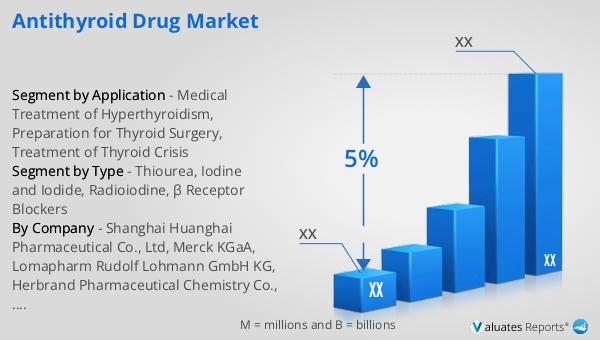What is Global Antithyroid Drug Market?
The Global Antithyroid Drug Market is a specialized segment within the broader pharmaceutical industry that focuses on medications used to treat hyperthyroidism, a condition where the thyroid gland produces excessive thyroid hormones. These drugs are essential for managing symptoms and preventing complications associated with overactive thyroid glands. The market includes various types of antithyroid medications, such as thiourea derivatives, iodine and iodide compounds, radioiodine, and β receptor blockers. These medications work through different mechanisms to reduce thyroid hormone production or mitigate the effects of excessive hormones on the body. The demand for antithyroid drugs is driven by the increasing prevalence of thyroid disorders, advancements in medical research, and the growing awareness of thyroid health. This market is crucial for providing effective treatment options for patients suffering from hyperthyroidism and related conditions, ensuring better health outcomes and improved quality of life.

Thiourea, Iodine and Iodide, Radioiodine, β Receptor Blockers in the Global Antithyroid Drug Market:
Thiourea derivatives, iodine and iodide compounds, radioiodine, and β receptor blockers are key components of the Global Antithyroid Drug Market, each playing a unique role in the treatment of hyperthyroidism. Thiourea derivatives, such as methimazole and propylthiouracil, inhibit the synthesis of thyroid hormones by blocking the enzyme thyroid peroxidase, which is essential for the production of these hormones. These drugs are commonly used as first-line treatments for hyperthyroidism due to their effectiveness in reducing hormone levels and managing symptoms. Iodine and iodide compounds, such as potassium iodide, work by temporarily inhibiting the release of thyroid hormones from the thyroid gland. This effect, known as the Wolff-Chaikoff effect, is particularly useful in preparing patients for thyroid surgery or in emergency situations like thyroid storm. Radioiodine, or radioactive iodine (I-131), is a treatment that involves the oral administration of radioactive iodine, which is selectively taken up by the thyroid gland. The radiation destroys overactive thyroid cells, leading to a reduction in hormone production. This treatment is often used for patients who do not respond to other medications or who prefer a non-surgical option. β receptor blockers, such as propranolol, do not directly affect thyroid hormone levels but are used to manage the symptoms of hyperthyroidism, such as rapid heart rate, tremors, and anxiety. By blocking the effects of excessive thyroid hormones on the cardiovascular system, β receptor blockers provide symptomatic relief and improve the quality of life for patients. Each of these drug classes has its own set of indications, benefits, and potential side effects, making them valuable tools in the comprehensive management of hyperthyroidism.
Medical Treatment of Hyperthyroidism, Preparation for Thyroid Surgery, Treatment of Thyroid Crisis in the Global Antithyroid Drug Market:
The Global Antithyroid Drug Market plays a crucial role in the medical treatment of hyperthyroidism, preparation for thyroid surgery, and treatment of thyroid crisis. In the medical treatment of hyperthyroidism, antithyroid drugs are used to reduce the production of thyroid hormones and manage symptoms such as weight loss, heat intolerance, and palpitations. Thiourea derivatives, such as methimazole and propylthiouracil, are commonly prescribed for long-term management, helping to achieve and maintain euthyroid status. These medications are particularly beneficial for patients who are not candidates for surgery or radioiodine therapy. In preparation for thyroid surgery, antithyroid drugs are used to stabilize thyroid hormone levels and reduce the risk of complications during and after the procedure. Potassium iodide is often administered to decrease vascularity and size of the thyroid gland, making the surgery safer and more manageable. This preoperative treatment is essential for ensuring optimal surgical outcomes and minimizing the risk of thyroid storm, a life-threatening condition characterized by a sudden and severe increase in thyroid hormone levels. In the treatment of thyroid crisis, also known as thyroid storm, antithyroid drugs are used as part of an emergency intervention to rapidly reduce thyroid hormone levels and control symptoms. High doses of thiourea derivatives, along with β receptor blockers and supportive care, are administered to stabilize the patient and prevent further complications. The prompt and effective use of antithyroid drugs in these critical situations can be life-saving, highlighting the importance of this market in providing essential treatments for thyroid disorders.
Global Antithyroid Drug Market Outlook:
The global pharmaceutical market was valued at 1,475 billion USD in 2022, with an expected compound annual growth rate (CAGR) of 5% over the next six years. In comparison, the chemical drug market saw an increase from 1,005 billion USD in 2018 to 1,094 billion USD in 2022. This growth reflects the expanding demand for pharmaceutical products and the continuous advancements in drug development and healthcare technologies. The increase in market value underscores the importance of the pharmaceutical industry in addressing various health conditions and improving patient outcomes. The antithyroid drug market, as a part of this broader industry, benefits from these trends, with ongoing research and development efforts leading to more effective and safer treatment options for patients with thyroid disorders. The steady growth in the pharmaceutical market also indicates a robust pipeline of new drugs and therapies, which can potentially enhance the management of hyperthyroidism and other thyroid-related conditions.
| Report Metric | Details |
| Report Name | Antithyroid Drug Market |
| CAGR | 5% |
| Segment by Type |
|
| Segment by Application |
|
| By Region |
|
| By Company | Shanghai Huanghai Pharmaceutical Co., Ltd, Merck KGaA, Lomapharm Rudolf Lohmann GmbH KG, Herbrand Pharmaceutical Chemistry Co., Ltd, Beijing Tongjida Pharmaceutical Co., Ltd, Shanghai Zhaohui Pharmaceutical Co., Ltd, Guangzhou Kanghe Pharmaceutical Co., Ltd, Hunan Hansen Pharmaceutical Co., Ltd, World Trade Tianjie Pharmaceutical (Jiangsu) Co., Ltd, Haimani Pharmaceutical Co., Ltd, Shanghai McLin Biochemical Technology Co., Ltd, Shanghai Yuanye Bio-Technology Co., Ltd, Amgen Inc, AbbVie Deutschland GmbH & Co.KG, Centrix Pharmaceutical Inc., Pfizer Inc., Actavis Totowa LLC, Caraco Pharmaceutical Laboratories, Boca Pharmacal Inc., Heritage Pharmaceuticals Inc., Par Pharmaceutical Inc, Sandoz Pharmaceuticals Inc. |
| Forecast units | USD million in value |
| Report coverage | Revenue and volume forecast, company share, competitive landscape, growth factors and trends |
